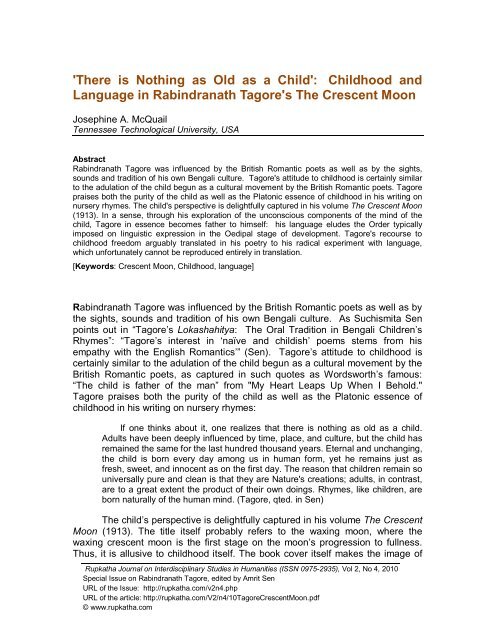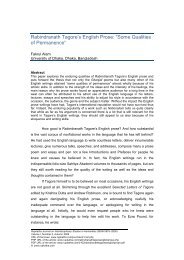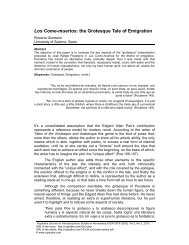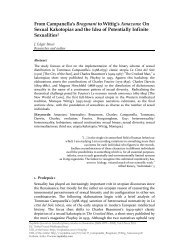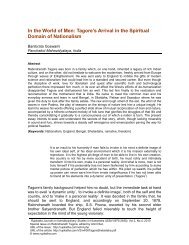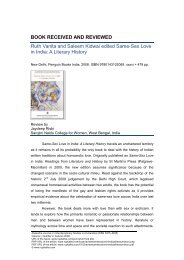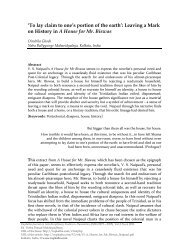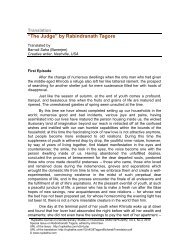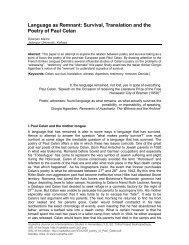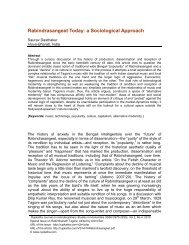There is Nothing as Old as a Child - Rupkatha Journal on ...
There is Nothing as Old as a Child - Rupkatha Journal on ...
There is Nothing as Old as a Child - Rupkatha Journal on ...
Create successful ePaper yourself
Turn your PDF publications into a flip-book with our unique Google optimized e-Paper software.
'<str<strong>on</strong>g>There</str<strong>on</strong>g> <str<strong>on</strong>g>is</str<strong>on</strong>g> <str<strong>on</strong>g>Nothing</str<strong>on</strong>g> <str<strong>on</strong>g>as</str<strong>on</strong>g> <str<strong>on</strong>g>Old</str<strong>on</strong>g> <str<strong>on</strong>g>as</str<strong>on</strong>g> a <str<strong>on</strong>g>Child</str<strong>on</strong>g>': <str<strong>on</strong>g>Child</str<strong>on</strong>g>hood and<br />
Language in Rabindranath Tagore's The Crescent Mo<strong>on</strong><br />
Josephine A. McQuail<br />
Tennessee Technological University, USA<br />
Abstract<br />
Rabindranath Tagore w<str<strong>on</strong>g>as</str<strong>on</strong>g> influenced by the Brit<str<strong>on</strong>g>is</str<strong>on</strong>g>h Romantic poets <str<strong>on</strong>g>as</str<strong>on</strong>g> well <str<strong>on</strong>g>as</str<strong>on</strong>g> by the sights,<br />
sounds and traditi<strong>on</strong> of h<str<strong>on</strong>g>is</str<strong>on</strong>g> own Bengali culture. Tagore's attitude to childhood <str<strong>on</strong>g>is</str<strong>on</strong>g> certainly similar<br />
to the adulati<strong>on</strong> of the child begun <str<strong>on</strong>g>as</str<strong>on</strong>g> a cultural movement by the Brit<str<strong>on</strong>g>is</str<strong>on</strong>g>h Romantic poets. Tagore<br />
pra<str<strong>on</strong>g>is</str<strong>on</strong>g>es both the purity of the child <str<strong>on</strong>g>as</str<strong>on</strong>g> well <str<strong>on</strong>g>as</str<strong>on</strong>g> the Plat<strong>on</strong>ic essence of childhood in h<str<strong>on</strong>g>is</str<strong>on</strong>g> writing <strong>on</strong><br />
nursery rhymes. The child's perspective <str<strong>on</strong>g>is</str<strong>on</strong>g> delightfully captured in h<str<strong>on</strong>g>is</str<strong>on</strong>g> volume The Crescent Mo<strong>on</strong><br />
(1913). In a sense, through h<str<strong>on</strong>g>is</str<strong>on</strong>g> explorati<strong>on</strong> of the unc<strong>on</strong>scious comp<strong>on</strong>ents of the mind of the<br />
child, Tagore in essence becomes father to himself: h<str<strong>on</strong>g>is</str<strong>on</strong>g> language eludes the Order typically<br />
imposed <strong>on</strong> lingu<str<strong>on</strong>g>is</str<strong>on</strong>g>tic expressi<strong>on</strong> in the Oedipal stage of development. Tagore's recourse to<br />
childhood freedom arguably translated in h<str<strong>on</strong>g>is</str<strong>on</strong>g> poetry to h<str<strong>on</strong>g>is</str<strong>on</strong>g> radical experiment with language,<br />
which unfortunately cannot be reproduced entirely in translati<strong>on</strong>.<br />
[Keywords: Crescent Mo<strong>on</strong>, <str<strong>on</strong>g>Child</str<strong>on</strong>g>hood, language]<br />
Rabindranath Tagore w<str<strong>on</strong>g>as</str<strong>on</strong>g> influenced by the Brit<str<strong>on</strong>g>is</str<strong>on</strong>g>h Romantic poets <str<strong>on</strong>g>as</str<strong>on</strong>g> well <str<strong>on</strong>g>as</str<strong>on</strong>g> by<br />
the sights, sounds and traditi<strong>on</strong> of h<str<strong>on</strong>g>is</str<strong>on</strong>g> own Bengali culture. As Such<str<strong>on</strong>g>is</str<strong>on</strong>g>mita Sen<br />
points out in “Tagore’s Lok<str<strong>on</strong>g>as</str<strong>on</strong>g>hahitya: The Oral Traditi<strong>on</strong> in Bengali <str<strong>on</strong>g>Child</str<strong>on</strong>g>ren’s<br />
Rhymes”: “Tagore’s interest in ‘naïve and child<str<strong>on</strong>g>is</str<strong>on</strong>g>h’ poems stems from h<str<strong>on</strong>g>is</str<strong>on</strong>g><br />
empathy with the Engl<str<strong>on</strong>g>is</str<strong>on</strong>g>h Romantics’” (Sen). Tagore’s attitude to childhood <str<strong>on</strong>g>is</str<strong>on</strong>g><br />
certainly similar to the adulati<strong>on</strong> of the child begun <str<strong>on</strong>g>as</str<strong>on</strong>g> a cultural movement by the<br />
Brit<str<strong>on</strong>g>is</str<strong>on</strong>g>h Romantic poets, <str<strong>on</strong>g>as</str<strong>on</strong>g> captured in such quotes <str<strong>on</strong>g>as</str<strong>on</strong>g> Wordsworth’s famous:<br />
“The child <str<strong>on</strong>g>is</str<strong>on</strong>g> father of the man” from "My Heart Leaps Up When I Behold."<br />
Tagore pra<str<strong>on</strong>g>is</str<strong>on</strong>g>es both the purity of the child <str<strong>on</strong>g>as</str<strong>on</strong>g> well <str<strong>on</strong>g>as</str<strong>on</strong>g> the Plat<strong>on</strong>ic essence of<br />
childhood in h<str<strong>on</strong>g>is</str<strong>on</strong>g> writing <strong>on</strong> nursery rhymes:<br />
If <strong>on</strong>e thinks about it, <strong>on</strong>e realizes that there <str<strong>on</strong>g>is</str<strong>on</strong>g> nothing <str<strong>on</strong>g>as</str<strong>on</strong>g> old <str<strong>on</strong>g>as</str<strong>on</strong>g> a child.<br />
Adults have been deeply influenced by time, place, and culture, but the child h<str<strong>on</strong>g>as</str<strong>on</strong>g><br />
remained the same for the l<str<strong>on</strong>g>as</str<strong>on</strong>g>t hundred thousand years. Eternal and unchanging,<br />
the child <str<strong>on</strong>g>is</str<strong>on</strong>g> born every day am<strong>on</strong>g us in human form, yet he remains just <str<strong>on</strong>g>as</str<strong>on</strong>g><br />
fresh, sweet, and innocent <str<strong>on</strong>g>as</str<strong>on</strong>g> <strong>on</strong> the first day. The re<str<strong>on</strong>g>as</str<strong>on</strong>g><strong>on</strong> that children remain so<br />
universally pure and clean <str<strong>on</strong>g>is</str<strong>on</strong>g> that they are Nature's creati<strong>on</strong>s; adults, in c<strong>on</strong>tr<str<strong>on</strong>g>as</str<strong>on</strong>g>t,<br />
are to a great extent the product of their own doings. Rhymes, like children, are<br />
born naturally of the human mind. (Tagore, qted. in Sen)<br />
The child’s perspective <str<strong>on</strong>g>is</str<strong>on</strong>g> delightfully captured in h<str<strong>on</strong>g>is</str<strong>on</strong>g> volume The Crescent<br />
Mo<strong>on</strong> (1913). The title itself probably refers to the waxing mo<strong>on</strong>, where the<br />
waxing crescent mo<strong>on</strong> <str<strong>on</strong>g>is</str<strong>on</strong>g> the first stage <strong>on</strong> the mo<strong>on</strong>’s progressi<strong>on</strong> to fullness.<br />
Thus, it <str<strong>on</strong>g>is</str<strong>on</strong>g> allusive to childhood itself. The book cover itself makes the image of<br />
<str<strong>on</strong>g>Rupkatha</str<strong>on</strong>g> <str<strong>on</strong>g>Journal</str<strong>on</strong>g> <strong>on</strong> Interd<str<strong>on</strong>g>is</str<strong>on</strong>g>ciplinary Studies in Humanities (ISSN 0975-2935), Vol 2, No 4, 2010<br />
Special Issue <strong>on</strong> Rabindranath Tagore, edited by Amrit Sen<br />
URL of the Issue: http://rupkatha.com/v2n4.php<br />
URL of the article: http://rupkatha.com/V2/n4/10TagoreCrescentMo<strong>on</strong>.pdf<br />
© www.rupkatha.com
492 <str<strong>on</strong>g>Rupkatha</str<strong>on</strong>g> <str<strong>on</strong>g>Journal</str<strong>on</strong>g> Vol 2 No 4<br />
the crescent mo<strong>on</strong> into a little baby swing in which lies a child (see figure 1).<br />
Ir<strong>on</strong>ically, the creative use of language evident in the work of geniuses like<br />
Wordsworth, Joyce and Tagore himself comes from the way in which they are in<br />
fact, fathers of themselves in the sense that lingu<str<strong>on</strong>g>is</str<strong>on</strong>g>tically they remain in the<br />
creative world of the infant mind. Th<str<strong>on</strong>g>is</str<strong>on</strong>g> creative world h<str<strong>on</strong>g>as</str<strong>on</strong>g>, in the view of such<br />
thinkers <str<strong>on</strong>g>as</str<strong>on</strong>g> Jacques Lacan been defined <str<strong>on</strong>g>as</str<strong>on</strong>g> the world of the feminine, before the<br />
Law of the Father steps in to fix the mind in language.<br />
Throughout The Crescent Mo<strong>on</strong>, Tagore rejects the values of the adult<br />
world of getting and spending -- the material world of adults which requires<br />
practicality and work. Tagore ends the volume The Crescent Mo<strong>on</strong> with a poem<br />
called “The L<str<strong>on</strong>g>as</str<strong>on</strong>g>t Bargain.” “The L<str<strong>on</strong>g>as</str<strong>on</strong>g>t Bargain” expresses, perhaps, the debt h<str<strong>on</strong>g>is</str<strong>on</strong>g><br />
poetry itself owes to the inspirati<strong>on</strong> of childhood:<br />
The sun gl<str<strong>on</strong>g>is</str<strong>on</strong>g>tened <strong>on</strong> the sand, and the sea waves broke waywardly.<br />
A child sat playing with shells.<br />
He ra<str<strong>on</strong>g>is</str<strong>on</strong>g>ed h<str<strong>on</strong>g>is</str<strong>on</strong>g> head and seemed to know me, and said, ‘I hire you with nothing.’<br />
From thenceforward that bargain struck in child's play made me a free man.<br />
(Tagore, CM, Google 82)<br />
Th<str<strong>on</strong>g>is</str<strong>on</strong>g> l<str<strong>on</strong>g>as</str<strong>on</strong>g>t poem dovetails nicely with the first, “The Home,” in which the<br />
speaker describes the natural beauty of the sunset <str<strong>on</strong>g>as</str<strong>on</strong>g> “hiding its l<str<strong>on</strong>g>as</str<strong>on</strong>g>t gold like a<br />
m<str<strong>on</strong>g>is</str<strong>on</strong>g>er” (Tagore, CM, Google 1). In c<strong>on</strong>tr<str<strong>on</strong>g>as</str<strong>on</strong>g>t to th<str<strong>on</strong>g>is</str<strong>on</strong>g>, while observing a boy <strong>on</strong> h<str<strong>on</strong>g>is</str<strong>on</strong>g><br />
way home through a field, the speaker meditates <strong>on</strong> the prevalence of children<br />
and child<str<strong>on</strong>g>is</str<strong>on</strong>g>h joy in life: “I stopped for a moment in my l<strong>on</strong>ely way under the<br />
starlight, and saw spread before me the darkened earth surrounding with her<br />
arms countless homes furn<str<strong>on</strong>g>is</str<strong>on</strong>g>hed with cradles and beds, mothers' hearts and<br />
evening lamps, and young lives glad with a gladness that knows nothing of its<br />
value for the world” (Tagore, CM, Google 1-2).<br />
The first Engl<str<strong>on</strong>g>is</str<strong>on</strong>g>h editi<strong>on</strong> of the collecti<strong>on</strong> The Crescent Mo<strong>on</strong> described the<br />
volume <str<strong>on</strong>g>as</str<strong>on</strong>g> “Poems of <str<strong>on</strong>g>Child</str<strong>on</strong>g>hood,” and its subtitle <str<strong>on</strong>g>is</str<strong>on</strong>g> "<str<strong>on</strong>g>Child</str<strong>on</strong>g>-poems." The poems<br />
are more obviously aimed at adults than children, but not all of them speak of the<br />
adult’s nostalgia for childhood. Although “The Home” would seem to imply that<br />
the child’s voice of s<strong>on</strong>g <str<strong>on</strong>g>is</str<strong>on</strong>g> untranslatable – “Suddenly a boy's shrill voice rose<br />
into the sky. He traversed the dark unseen, leaving the track of h<str<strong>on</strong>g>is</str<strong>on</strong>g> s<strong>on</strong>g across<br />
the hush of the evening” (Tagore, CM, Google 1) the poem reads, <str<strong>on</strong>g>as</str<strong>on</strong>g> if the words<br />
of the s<strong>on</strong>g are not heard, but just the sound of the boy’s voice, singing – Tagore<br />
captures the voice of children.<br />
Tagore renders the limitlessness of children/s imaginati<strong>on</strong> in the poem "On<br />
the Se<str<strong>on</strong>g>as</str<strong>on</strong>g>hore."
493 '<str<strong>on</strong>g>There</str<strong>on</strong>g> <str<strong>on</strong>g>is</str<strong>on</strong>g> <str<strong>on</strong>g>Nothing</str<strong>on</strong>g> <str<strong>on</strong>g>as</str<strong>on</strong>g> <str<strong>on</strong>g>Old</str<strong>on</strong>g> <str<strong>on</strong>g>as</str<strong>on</strong>g> a <str<strong>on</strong>g>Child</str<strong>on</strong>g>': <str<strong>on</strong>g>Child</str<strong>on</strong>g>hood and Language in Rabindranath<br />
Tagore's The Crescent Mo<strong>on</strong><br />
Figure 1: [from a drawing by Nandalall Bose; www.ibiblio.org e-text of The Crescent Mo<strong>on</strong>,<br />
L<strong>on</strong>d<strong>on</strong> and New York: Macmillan and Co., 1913]<br />
On the se<str<strong>on</strong>g>as</str<strong>on</strong>g>hore of endless worlds children meet.<br />
The infinite sky <str<strong>on</strong>g>is</str<strong>on</strong>g> moti<strong>on</strong>less overhead and the restless<br />
water <str<strong>on</strong>g>is</str<strong>on</strong>g> bo<str<strong>on</strong>g>is</str<strong>on</strong>g>terous. On the se<str<strong>on</strong>g>as</str<strong>on</strong>g>hore of endless worlds<br />
the children meet with shouts and dances.<br />
(Tagore, CM, Google 3)<br />
The poem ends with a difference:<br />
On the se<str<strong>on</strong>g>as</str<strong>on</strong>g>hore of endless worlds children meet.<br />
Tempest roams in the pathless sky, ships are wrecked in<br />
the trackless water, death <str<strong>on</strong>g>is</str<strong>on</strong>g> abroad and children play. On<br />
the se<str<strong>on</strong>g>as</str<strong>on</strong>g>hore of endless worlds <str<strong>on</strong>g>is</str<strong>on</strong>g> the great meeting of<br />
children. (Tagore, CM, Google 4)<br />
Throughout the poem, the careless world of<br />
childlike joy <str<strong>on</strong>g>is</str<strong>on</strong>g> c<strong>on</strong>tr<str<strong>on</strong>g>as</str<strong>on</strong>g>ted to the adult world of work<br />
and death of which the children are unaware:<br />
The sea surges up with laughter, and pale gleams the<br />
smile of the sea-beach. Death-dealing waves sing<br />
meaningless ballads to the children, even like a mother<br />
while rocking her baby's cradle. The sea plays with<br />
children, and pale gleams the smile of the sea-beach.<br />
(Tagore, CM, Google 4)<br />
hands of a mother.<br />
Possibly dangerous waves are no more threatening<br />
than the gentle rocking of a child's cradle at the<br />
Th<str<strong>on</strong>g>is</str<strong>on</strong>g> l<str<strong>on</strong>g>as</str<strong>on</strong>g>t verse above brings up the literature that had early <strong>on</strong> captured<br />
Tagore's interest and possibly led him to the admirati<strong>on</strong> of the state of childhood:<br />
folklore, and specifically nursery rhymes. In Lok<str<strong>on</strong>g>as</str<strong>on</strong>g>hahita [Folklore], in the essay<br />
“Chhelebhulano Chharha” [Nursery Rhymes] (1907) Tagore reports that: “For<br />
some time now I have been busy collecting the rhymes that women in Bengal<br />
use to amuse children. These rhymes have a special significance for the study of<br />
our language and social h<str<strong>on</strong>g>is</str<strong>on</strong>g>tory, but it <str<strong>on</strong>g>is</str<strong>on</strong>g> their natural, sp<strong>on</strong>taneous poetic quality<br />
that h<str<strong>on</strong>g>as</str<strong>on</strong>g> been of even greater value to me” (Tagore, qted in Sen). Sen <str<strong>on</strong>g>as</str<strong>on</strong>g>serts<br />
that Tagore began collecting folklore <str<strong>on</strong>g>as</str<strong>on</strong>g> early <str<strong>on</strong>g>as</str<strong>on</strong>g> 1883, led by a “Romantic<br />
Nati<strong>on</strong>al<str<strong>on</strong>g>is</str<strong>on</strong>g>m (Sen), which <str<strong>on</strong>g>is</str<strong>on</strong>g> comparable, surely, with early Yeats and h<str<strong>on</strong>g>is</str<strong>on</strong>g><br />
explorati<strong>on</strong> of Ir<str<strong>on</strong>g>is</str<strong>on</strong>g>h/Gaelic folklore. The boy’s unheard s<strong>on</strong>g may be seen <str<strong>on</strong>g>as</str<strong>on</strong>g><br />
representing the very oral traditi<strong>on</strong>–the stuff of folklore itself–that Tagore w<str<strong>on</strong>g>is</str<strong>on</strong>g>hes<br />
to capture, but which <str<strong>on</strong>g>is</str<strong>on</strong>g> essentially untranslatable, for, when divorced from its<br />
c<strong>on</strong>text in life <str<strong>on</strong>g>as</str<strong>on</strong>g> people live it, in touch with the homey traditi<strong>on</strong>s of family and<br />
regi<strong>on</strong>al life, it loses its meaning.
494 <str<strong>on</strong>g>Rupkatha</str<strong>on</strong>g> <str<strong>on</strong>g>Journal</str<strong>on</strong>g> Vol 2 No 4<br />
Tagore refers to the snobb<str<strong>on</strong>g>is</str<strong>on</strong>g>m with which high culture views “low” or<br />
popular culture, and eschews aesthetic judgment with poetry in general,<br />
<str<strong>on</strong>g>as</str<strong>on</strong>g>serting that the aesthetic judgment of what <str<strong>on</strong>g>is</str<strong>on</strong>g> “good” or “bad” poetry does not<br />
apply:<br />
Th<str<strong>on</strong>g>is</str<strong>on</strong>g> <str<strong>on</strong>g>is</str<strong>on</strong>g> especially true with these children's rhymes, which are intricately<br />
c<strong>on</strong>nected with my own life and emoti<strong>on</strong>. It <str<strong>on</strong>g>is</str<strong>on</strong>g> impossible for me to separate the<br />
ple<str<strong>on</strong>g>as</str<strong>on</strong>g>ures of my childhood memories from the enjoyment I derive from these<br />
rhymes. It <str<strong>on</strong>g>is</str<strong>on</strong>g> best to admit at the very beginning that my powers of d<str<strong>on</strong>g>is</str<strong>on</strong>g>criminati<strong>on</strong><br />
do not suffice to let me say how much of th<str<strong>on</strong>g>is</str<strong>on</strong>g> ple<str<strong>on</strong>g>as</str<strong>on</strong>g>ure <str<strong>on</strong>g>is</str<strong>on</strong>g> rooted in my<br />
remin<str<strong>on</strong>g>is</str<strong>on</strong>g>cences and how much in eternal literary ideals.<br />
The line, "The rain falls tip tap, the river gets flooded" (br<str<strong>on</strong>g>is</str<strong>on</strong>g>ti pade tapur<br />
tupur, nadi elo ban), w<str<strong>on</strong>g>as</str<strong>on</strong>g> like a magic chant for me, and the feelings<br />
aroused by th<str<strong>on</strong>g>is</str<strong>on</strong>g> rhyme remain <str<strong>on</strong>g>as</str<strong>on</strong>g> intense <str<strong>on</strong>g>as</str<strong>on</strong>g> ever. Recalling these feelings,<br />
I can appreciate the appeal and charm of such rhymes in general, and I<br />
understand why these meaningless, sp<strong>on</strong>taneous rhythms flow eternally<br />
through human memory, while so many epics, romances, essays,<br />
serm<strong>on</strong>s, and other products of meticulous human effort are lost every<br />
day. <str<strong>on</strong>g>There</str<strong>on</strong>g> <str<strong>on</strong>g>is</str<strong>on</strong>g> a certain permanency in these rhymes. No accounts of their<br />
composers ex<str<strong>on</strong>g>is</str<strong>on</strong>g>t, and no <strong>on</strong>e <str<strong>on</strong>g>as</str<strong>on</strong>g>ks the date <strong>on</strong> which they were written.<br />
Because of th<str<strong>on</strong>g>is</str<strong>on</strong>g> sp<strong>on</strong>taneous universality they are age-old even if<br />
composed today, and remain fresh even if a thousand years old. (Tagore,<br />
qted in Sen)<br />
The poem "My S<strong>on</strong>g" <str<strong>on</strong>g>is</str<strong>on</strong>g> a tribute to the nursery rhyme format and the<br />
c<strong>on</strong>tinuing memory the child will retain of the parent's s<strong>on</strong>g:<br />
Th<str<strong>on</strong>g>is</str<strong>on</strong>g> s<strong>on</strong>g of mine will wind its music around you, my child, like the f<strong>on</strong>d arms of<br />
love.<br />
Th<str<strong>on</strong>g>is</str<strong>on</strong>g> s<strong>on</strong>g of mine will touch your forehead like a k<str<strong>on</strong>g>is</str<strong>on</strong>g>s of blessing.<br />
When you are al<strong>on</strong>e it will sit by your side and wh<str<strong>on</strong>g>is</str<strong>on</strong>g>per in your ear, when you are<br />
in the crowd it will fence you about with aloofness.<br />
My s<strong>on</strong>g will be like a pair of wings to your dreams, it will transport your heart to<br />
the verge of the unknown.<br />
It will be like the faithful star overhead when dark night <str<strong>on</strong>g>is</str<strong>on</strong>g> over your road.<br />
My s<strong>on</strong>g will sit in the pupils of your eyes, and will carry your sight into the heart<br />
of things.<br />
And when my voice <str<strong>on</strong>g>is</str<strong>on</strong>g> silent in death, my s<strong>on</strong>g will speak in your living heart.<br />
(Tagore, CM, Google 78)<br />
The folk form of the nursery rhyme, the n<strong>on</strong>sense words "tip tap"– "tapur<br />
tupur"—transport Tagore even in h<str<strong>on</strong>g>is</str<strong>on</strong>g> adulthood back to h<str<strong>on</strong>g>is</str<strong>on</strong>g> childhood, becoming<br />
the "magic chant," the "pair of wings to your dreams." The adult speaker hopes<br />
that her s<strong>on</strong>g will res<strong>on</strong>ate with the child--but not just res<strong>on</strong>ate, will become part<br />
of h<str<strong>on</strong>g>is</str<strong>on</strong>g> being: "My s<strong>on</strong>g will sit in the pupils of your eyes, and will carry your sight
495 '<str<strong>on</strong>g>There</str<strong>on</strong>g> <str<strong>on</strong>g>is</str<strong>on</strong>g> <str<strong>on</strong>g>Nothing</str<strong>on</strong>g> <str<strong>on</strong>g>as</str<strong>on</strong>g> <str<strong>on</strong>g>Old</str<strong>on</strong>g> <str<strong>on</strong>g>as</str<strong>on</strong>g> a <str<strong>on</strong>g>Child</str<strong>on</strong>g>': <str<strong>on</strong>g>Child</str<strong>on</strong>g>hood and Language in Rabindranath<br />
Tagore's The Crescent Mo<strong>on</strong><br />
into the heart of things.".<br />
Tagore's poem in The Crescent Mo<strong>on</strong> "Playthings" pra<str<strong>on</strong>g>is</str<strong>on</strong>g>es the imaginati<strong>on</strong><br />
and creativity of the child:<br />
<str<strong>on</strong>g>Child</str<strong>on</strong>g>, how happy you are sitting in the dust, playing with a broken twig all the<br />
morning.<br />
I smile at your play with that little bit of a broken twig.<br />
I am busy with my accounts, adding up figures by the hour.<br />
Perhaps you glance at me and think, ‘What a stupid game to spoil your morning<br />
with!’<br />
<str<strong>on</strong>g>Child</str<strong>on</strong>g>, I have forgotten the art of being absorbed in sticks and mud-pies.<br />
I seek out costly playthings, and gather lumps of gold and silver.<br />
With whatever you find you create your glad games, I spend both my time and<br />
my strength over things I never can obtain.<br />
In my frail canoe I struggle to cross the sea of desire, and forget that I too am<br />
playing a game. (Tagore, CM, Google 22)<br />
The "meaningless, sp<strong>on</strong>taneous rhythms” -- the "meaningless ballads" of<br />
nursery rhymes -- are the equivalents of the "sticks and mudpies" which the child<br />
plays with, or the sandc<str<strong>on</strong>g>as</str<strong>on</strong>g>tles of "On the Se<str<strong>on</strong>g>as</str<strong>on</strong>g>hore." The simple joy of sound<br />
that n<strong>on</strong>sense nursery rhymes c<strong>on</strong>vey, formal, high poetry captures more<br />
deliberately <strong>on</strong> occ<str<strong>on</strong>g>as</str<strong>on</strong>g>i<strong>on</strong>, but cannot equal the simple ecst<str<strong>on</strong>g>as</str<strong>on</strong>g>y that a child feels<br />
chanting n<strong>on</strong>sense rhymes, or, harking back to Wordsworth's "The Idiot Boy'" for<br />
example, the simple "Burrr" which the "idiot" boy Johnny utters in "The Idiot Boy"<br />
in Lyrical Ballads:<br />
Burr, burr – now Johnny’s lips they burr,<br />
As loud <str<strong>on</strong>g>as</str<strong>on</strong>g> any mill, or near it,<br />
Meek <str<strong>on</strong>g>as</str<strong>on</strong>g> a lamb the p<strong>on</strong>y moves,<br />
And Johnny makes the no<str<strong>on</strong>g>is</str<strong>on</strong>g>e he loves,<br />
And Betty l<str<strong>on</strong>g>is</str<strong>on</strong>g>tens, glad to hear it. (Wordsworth, “The Idiot Boy,” l. 107-111, Lyrical<br />
Ballads, 88)<br />
As we have seen, many of the poems in The Crescent Mo<strong>on</strong> deal with the<br />
adult's imaginative debt to and admirati<strong>on</strong> of children. However, some of the<br />
poems quite c<strong>on</strong>vincingly capture the voice of the child. For instance, in "The<br />
Astr<strong>on</strong>omer"<br />
I <strong>on</strong>ly said, "When in the evening the round full mo<strong>on</strong> gets entangled am<strong>on</strong>g the<br />
branches of that Kadam tree, couldn't somebody catch it"<br />
But dâdâ [elder brother] laughed at me and said, "Baby, you are the silliest child I<br />
have ever known. The mo<strong>on</strong> <str<strong>on</strong>g>is</str<strong>on</strong>g> ever so far from us, how could anybody catch it"<br />
(Tagore, CM, Google 25)<br />
Dâdâ -- the older brother -- <str<strong>on</strong>g>is</str<strong>on</strong>g> <strong>on</strong>e of the threatening father figures in the volume.<br />
Most of the poems deal with the child's relati<strong>on</strong>ship with the mother, but when<br />
father figures enter into the poems an Oedipal threat seems to be lurking almost
496 <str<strong>on</strong>g>Rupkatha</str<strong>on</strong>g> <str<strong>on</strong>g>Journal</str<strong>on</strong>g> Vol 2 No 4<br />
inevitably.<br />
Fig. 2 [from a drawing by Asit Kumar<br />
Haldar, www.ibiblio.org e-text of The<br />
Crescent Mo<strong>on</strong>, L<strong>on</strong>d<strong>on</strong> and New York:<br />
Macmillan and Co., 1913]<br />
According to the psychoanalyst<br />
Jacques Lacan, when the child enters<br />
the symbolic realm of language, the<br />
Law of the Father must be embraced.<br />
Interestingly, the play of language in<br />
radical lingu<str<strong>on</strong>g>is</str<strong>on</strong>g>tic experiments like<br />
Joyce's Finnegans Wake, in Lacan's<br />
view, <str<strong>on</strong>g>is</str<strong>on</strong>g> rebelli<strong>on</strong> against the Law of<br />
the Father. In "The <str<strong>on</strong>g>Child</str<strong>on</strong>g> Angel" the<br />
adult world of cruelty and competiti<strong>on</strong><br />
<str<strong>on</strong>g>is</str<strong>on</strong>g> c<strong>on</strong>tr<str<strong>on</strong>g>as</str<strong>on</strong>g>ted to the child's innocence:<br />
They clamour and fight, they doubt and<br />
despair, they know no end to their<br />
wranglings.<br />
Let your life come am<strong>on</strong>gst them like a<br />
flame of light, my child, unflickering and<br />
pure, and delight them into silence.<br />
They are cruel in their greed and their<br />
envy, their words are like hidden knives<br />
thirsting for blood. (Tagore, CM, Google 79)<br />
The language of the adult world <str<strong>on</strong>g>is</str<strong>on</strong>g> given dangerous phallic attributes, and<br />
the child <str<strong>on</strong>g>is</str<strong>on</strong>g> told:<br />
Let them see your face, my child, and thus know the meaning of all things; let<br />
them love you and thus love each other.<br />
Come and take your seat in the bosom of the limitless, my child. At sunr<str<strong>on</strong>g>is</str<strong>on</strong>g>e open<br />
and ra<str<strong>on</strong>g>is</str<strong>on</strong>g>e your heart like a blossoming flower, and at sunset bend your head and<br />
in silence complete the worship of the day. (Tagore, CM, Google 79-80)<br />
The child <str<strong>on</strong>g>is</str<strong>on</strong>g> <str<strong>on</strong>g>as</str<strong>on</strong>g>ked to serve <str<strong>on</strong>g>as</str<strong>on</strong>g> a model for the adult, and, interestingly,<br />
worship the day in silence. The adult speaker in the poem prefers the silence of<br />
the "child-angel" (Tagore, CM, Google) to the cutting, phallic language of<br />
adulthood. Even in the poem “Playthings,” the line “In my frail canoe I struggle to<br />
cross the sea of desire” (Tagore, CM, Google 22) c<strong>on</strong>tr<str<strong>on</strong>g>as</str<strong>on</strong>g>ts the phallic canoe with<br />
the feminine “sea of desire” which the canoe cuts through. It <str<strong>on</strong>g>is</str<strong>on</strong>g> interesting that in<br />
h<str<strong>on</strong>g>is</str<strong>on</strong>g> early memory of the nursery rhyme what <str<strong>on</strong>g>is</str<strong>on</strong>g> being described <str<strong>on</strong>g>is</str<strong>on</strong>g> the overflowing
497 '<str<strong>on</strong>g>There</str<strong>on</strong>g> <str<strong>on</strong>g>is</str<strong>on</strong>g> <str<strong>on</strong>g>Nothing</str<strong>on</strong>g> <str<strong>on</strong>g>as</str<strong>on</strong>g> <str<strong>on</strong>g>Old</str<strong>on</strong>g> <str<strong>on</strong>g>as</str<strong>on</strong>g> a <str<strong>on</strong>g>Child</str<strong>on</strong>g>': <str<strong>on</strong>g>Child</str<strong>on</strong>g>hood and Language in Rabindranath<br />
Tagore's The Crescent Mo<strong>on</strong><br />
river, in a story of brides, allied <strong>on</strong>ce again with the female. Many of the legends<br />
and folktales which Tagore cites are <str<strong>on</strong>g>as</str<strong>on</strong>g>sociated with the culture of women in<br />
Bengali culture.<br />
The c<strong>on</strong>necti<strong>on</strong> with the mother <str<strong>on</strong>g>is</str<strong>on</strong>g> again emph<str<strong>on</strong>g>as</str<strong>on</strong>g>ized in "Baby's Way":<br />
Baby knows all manner of w<str<strong>on</strong>g>is</str<strong>on</strong>g>e words, though few <strong>on</strong> earth can understand their<br />
meaning.<br />
It <str<strong>on</strong>g>is</str<strong>on</strong>g> not for nothing that he never wants to speak.<br />
The <strong>on</strong>e thing he wants <str<strong>on</strong>g>is</str<strong>on</strong>g> to learn mother's words from mother's lips. That <str<strong>on</strong>g>is</str<strong>on</strong>g> why<br />
he looks so innocent. (Tagore, CM, Google 7)<br />
The very word "infans" means "without speech" in Latin. It <str<strong>on</strong>g>is</str<strong>on</strong>g> interesting how<br />
many of the poems in Crescent Mo<strong>on</strong> bring up th<str<strong>on</strong>g>is</str<strong>on</strong>g> baby's lack of language. Just<br />
<str<strong>on</strong>g>as</str<strong>on</strong>g> in the poem "The Home," though, the silence of the baby speaks volumes. In<br />
"Baby's World" the speaker says:<br />
I w<str<strong>on</strong>g>is</str<strong>on</strong>g>h I could travel by the road that crosses baby's mind, and out bey<strong>on</strong>d all<br />
bounds;<br />
Where messengers run errands for no cause between the kingdoms of kings of<br />
no h<str<strong>on</strong>g>is</str<strong>on</strong>g>tory;<br />
Where Re<str<strong>on</strong>g>as</str<strong>on</strong>g><strong>on</strong> makes kites of her laws and flies them, and Truth sets Fact free<br />
from its fetters. (Tagore, CM, Google 17)<br />
The adult w<str<strong>on</strong>g>is</str<strong>on</strong>g>hes for the baby's mind, a world that does not accept or<br />
understand adult realities. Once again the w<strong>on</strong>derful line “Where Re<str<strong>on</strong>g>as</str<strong>on</strong>g><strong>on</strong> makes<br />
kites of her laws and flies them, and Truth sets Fact free from its fetters”<br />
(Tagore, CM, Google 17) expresses the rebelli<strong>on</strong> against the logical progressi<strong>on</strong><br />
of ordinary d<str<strong>on</strong>g>is</str<strong>on</strong>g>course. Th<str<strong>on</strong>g>is</str<strong>on</strong>g> world of self-f<str<strong>on</strong>g>as</str<strong>on</strong>g>hi<strong>on</strong>ed expressi<strong>on</strong> “Where<br />
messengers run errands for no cause between the kingdoms of kings of no<br />
h<str<strong>on</strong>g>is</str<strong>on</strong>g>tory” (Tagore, CM, Google 17) ex<str<strong>on</strong>g>is</str<strong>on</strong>g>ts, but it ex<str<strong>on</strong>g>is</str<strong>on</strong>g>ts in a psychological state that<br />
precedes the accessi<strong>on</strong> to the -- in psychoanalytic terms -- the Reality Principle,<br />
coming before the Oedipal stage where the Reality Principle <str<strong>on</strong>g>is</str<strong>on</strong>g> eluded. These<br />
psychoanalytic theories often draw scorn, but The Crescent Mo<strong>on</strong> and its poems<br />
serves <str<strong>on</strong>g>as</str<strong>on</strong>g> a perfect illustrati<strong>on</strong> of many of psychoanalys<str<strong>on</strong>g>is</str<strong>on</strong>g>’ key c<strong>on</strong>cepts.<br />
Particularly striking <str<strong>on</strong>g>is</str<strong>on</strong>g> the special capability of children to escape the<br />
unquesti<strong>on</strong>able realities and authorities of the adult world. In the view of Jacques<br />
Lacan, according to the Australian scholar and critic Matthew Sharpe:<br />
to learn a language <str<strong>on</strong>g>is</str<strong>on</strong>g> to learn a set of rules or laws for the use and combinati<strong>on</strong><br />
of words. Accordingly, for him too, “learning <str<strong>on</strong>g>is</str<strong>on</strong>g> b<str<strong>on</strong>g>as</str<strong>on</strong>g>ed <strong>on</strong> believing”…Particularly,<br />
Lacan <str<strong>on</strong>g>as</str<strong>on</strong>g>serts a l<str<strong>on</strong>g>as</str<strong>on</strong>g>ting link between the capacity of subjects to perceive the<br />
world <str<strong>on</strong>g>as</str<strong>on</strong>g> a set of d<str<strong>on</strong>g>is</str<strong>on</strong>g>crete identifiable objects, and their acceptance of the<br />
unc<strong>on</strong>diti<strong>on</strong>al authority of a body of c<strong>on</strong>venti<strong>on</strong>. (“Jacques Lacan”)<br />
In Lacan's view, rejecting the Law of the Father would mean that th<str<strong>on</strong>g>is</str<strong>on</strong>g><br />
unc<strong>on</strong>diti<strong>on</strong>al authority <str<strong>on</strong>g>is</str<strong>on</strong>g> not accepted. Ordinarily, th<str<strong>on</strong>g>is</str<strong>on</strong>g> would lead to pathological
498 <str<strong>on</strong>g>Rupkatha</str<strong>on</strong>g> <str<strong>on</strong>g>Journal</str<strong>on</strong>g> Vol 2 No 4<br />
c<strong>on</strong>diti<strong>on</strong>s like psychos<str<strong>on</strong>g>is</str<strong>on</strong>g>.<br />
Th<str<strong>on</strong>g>is</str<strong>on</strong>g> multivalent signifying of literature may be compared: "to a game<br />
whose meaning <str<strong>on</strong>g>is</str<strong>on</strong>g> always doubled by the signifier:[because] literal meaning and<br />
figurative meaning, lexical meaning and c<strong>on</strong>textual meaning <str<strong>on</strong>g>is</str<strong>on</strong>g> what poetry<br />
exploits, says Lacan, in order to wreak violence <strong>on</strong> language" (Hocq).<br />
Symbolically, th<str<strong>on</strong>g>is</str<strong>on</strong>g> wreaking havoc <strong>on</strong> language <str<strong>on</strong>g>is</str<strong>on</strong>g> an attack <strong>on</strong> the authority of the<br />
symbolic Father.<br />
Accordingly, the child in The Crescent Mo<strong>on</strong> often takes the place of the<br />
father, literally. In "The Wicked Post Man," the child speaker sees that h<str<strong>on</strong>g>is</str<strong>on</strong>g> mother<br />
<str<strong>on</strong>g>is</str<strong>on</strong>g> upset at, he c<strong>on</strong>jectures, the fact that the father's letters have stopped coming.<br />
The child determines to write for h<str<strong>on</strong>g>is</str<strong>on</strong>g> father,<br />
I myself will write all father's letters; you will not find a single m<str<strong>on</strong>g>is</str<strong>on</strong>g>take.<br />
I shall write from A right up to K.<br />
But, mother, why do you smile<br />
You d<strong>on</strong>'t believe that I can write <str<strong>on</strong>g>as</str<strong>on</strong>g> nicely <str<strong>on</strong>g>as</str<strong>on</strong>g> father does!<br />
But I shall rule my paper carefully, and write all the letters beautifully big.<br />
When I fin<str<strong>on</strong>g>is</str<strong>on</strong>g>h my writing, do you think I shall be so fool<str<strong>on</strong>g>is</str<strong>on</strong>g>h <str<strong>on</strong>g>as</str<strong>on</strong>g> father and drop it<br />
into the horrid postman's bag<br />
I shall bring it to you myself without waiting, and letter by letter help you to read<br />
my writing.<br />
I know the postman does not like to give you the really nice letters. (Tagore, CM,<br />
Google 61)<br />
Th<str<strong>on</strong>g>is</str<strong>on</strong>g> p<str<strong>on</strong>g>as</str<strong>on</strong>g>sage in Tagore seems to prove Lacan’s point made when d<str<strong>on</strong>g>is</str<strong>on</strong>g>cussing the<br />
“Fort! Da!” game of a child m<str<strong>on</strong>g>as</str<strong>on</strong>g>tering the absence of a love object – h<str<strong>on</strong>g>is</str<strong>on</strong>g> mother –<br />
<str<strong>on</strong>g>as</str<strong>on</strong>g> observed by Freud: “These are the games of occultati<strong>on</strong> which Freud, in a<br />
fl<str<strong>on</strong>g>as</str<strong>on</strong>g>h of genius, revealed to us so that we might recognize in them that the<br />
moment in which desire becomes human <str<strong>on</strong>g>is</str<strong>on</strong>g> also that in which the child <str<strong>on</strong>g>is</str<strong>on</strong>g> born<br />
into language” (Lacan 103). Here, the child says to the mother he will forbear the<br />
d<str<strong>on</strong>g>is</str<strong>on</strong>g>appearance of the object, the letter, into “the horrid postman’s bag” (Tagore,<br />
CM Google 61). The child “rules” h<str<strong>on</strong>g>is</str<strong>on</strong>g> paper at le<str<strong>on</strong>g>as</str<strong>on</strong>g>t, but also commandeers h<str<strong>on</strong>g>is</str<strong>on</strong>g><br />
father’s letter/letters. The slipperiness of the signifier here – the word “letter”<br />
which can refer to both a letter that <str<strong>on</strong>g>is</str<strong>on</strong>g> written and the letters of the alphabet –<br />
dem<strong>on</strong>strates the lingu<str<strong>on</strong>g>is</str<strong>on</strong>g>tic rebelli<strong>on</strong> of the child who h<str<strong>on</strong>g>as</str<strong>on</strong>g> not acceded to the Law<br />
of the Father. The child’s reluctance to deposit h<str<strong>on</strong>g>is</str<strong>on</strong>g> letter into the postman’s bag<br />
<str<strong>on</strong>g>is</str<strong>on</strong>g> perhaps the reluctance to enter into the “system of the c<strong>on</strong>crete d<str<strong>on</strong>g>is</str<strong>on</strong>g>course of<br />
h<str<strong>on</strong>g>is</str<strong>on</strong>g> envir<strong>on</strong>ment” (Lacan 103) – he acknowledges the “here” – the presence of<br />
the object, but not the “there” – the loss of the object<br />
In "The Hero" the child becomes the defender of the mother against an<br />
attack by thieves, and the brother, th<str<strong>on</strong>g>is</str<strong>on</strong>g> time, h<str<strong>on</strong>g>as</str<strong>on</strong>g> to admit that the little brother <str<strong>on</strong>g>is</str<strong>on</strong>g><br />
the hero:<br />
Mother, let us imagine we are travelling, and p<str<strong>on</strong>g>as</str<strong>on</strong>g>sing through a strange and
499 '<str<strong>on</strong>g>There</str<strong>on</strong>g> <str<strong>on</strong>g>is</str<strong>on</strong>g> <str<strong>on</strong>g>Nothing</str<strong>on</strong>g> <str<strong>on</strong>g>as</str<strong>on</strong>g> <str<strong>on</strong>g>Old</str<strong>on</strong>g> <str<strong>on</strong>g>as</str<strong>on</strong>g> a <str<strong>on</strong>g>Child</str<strong>on</strong>g>': <str<strong>on</strong>g>Child</str<strong>on</strong>g>hood and Language in Rabindranath<br />
Tagore's The Crescent Mo<strong>on</strong><br />
dangerous country.<br />
You are riding in a palanquin and I am trotting by you <strong>on</strong> a red horse.<br />
. . . . . . . . . . . . . . . . . . . . . . . . . . . . . . . . . .. .<br />
It would be like a story in a book.<br />
My brother would say, 'Is it possible I always thought he w<str<strong>on</strong>g>as</str<strong>on</strong>g> so delicate!'<br />
Our village people would all say in amazement, 'W<str<strong>on</strong>g>as</str<strong>on</strong>g> it not lucky that the boy<br />
w<str<strong>on</strong>g>as</str<strong>on</strong>g> with h<str<strong>on</strong>g>is</str<strong>on</strong>g> mother' (Tagore, CM, Google 65)<br />
The poem "Authorship" rejects the language of the father, preferring the<br />
stories of the mother. We see literally a kind of war of words; a war of languages<br />
between the play of the child and the mysterious practicality of the Father:<br />
You say that father writes a lot of books, but what he writes I d<strong>on</strong>'t understand.<br />
He w<str<strong>on</strong>g>as</str<strong>on</strong>g> reading to you all the evening, but could you really make out what he<br />
meant<br />
What nice stories, mother, you can tell us! Why can't father write like that, I<br />
w<strong>on</strong>der<br />
Did he never hear from h<str<strong>on</strong>g>is</str<strong>on</strong>g> own mother stories of giants and fairies and<br />
princesses<br />
H<str<strong>on</strong>g>as</str<strong>on</strong>g> he forgotten them all (Tagore, CM, Google 58)<br />
Through all of these examples, it seems <str<strong>on</strong>g>as</str<strong>on</strong>g> if th<str<strong>on</strong>g>is</str<strong>on</strong>g> speaker, and others in<br />
The Crescent Mo<strong>on</strong> have rejected the language of the Father; in Lacan's terms,<br />
the M<str<strong>on</strong>g>as</str<strong>on</strong>g>ter Signifiers are being rejected in the poem, <str<strong>on</strong>g>as</str<strong>on</strong>g> in the poem<br />
"Authorship.” The mother’s language of imaginati<strong>on</strong> <str<strong>on</strong>g>is</str<strong>on</strong>g> what <str<strong>on</strong>g>is</str<strong>on</strong>g> preferred. The<br />
authority represented by the Father in the Oedipal ph<str<strong>on</strong>g>as</str<strong>on</strong>g>e <str<strong>on</strong>g>is</str<strong>on</strong>g> normally acceded to,<br />
but Tagore’s poems in The Crescent Mo<strong>on</strong> by and large reject and undermine<br />
the authority of Father or older brother. The child speaker does not accept the<br />
Reality Principle usually acceded to by the growing child:<br />
The subject, by speaking, addresses himself to some Other supposed to<br />
know her/h<str<strong>on</strong>g>is</str<strong>on</strong>g> truth, and at the end of th<str<strong>on</strong>g>is</str<strong>on</strong>g> process, the signifiers he offers to the<br />
Other are quilted, and return to him ‘in an inverted form.’<br />
What h<str<strong>on</strong>g>as</str<strong>on</strong>g> occurred at th<str<strong>on</strong>g>is</str<strong>on</strong>g> point, <strong>on</strong> Lacan’s reck<strong>on</strong>ing, <str<strong>on</strong>g>is</str<strong>on</strong>g> that the<br />
previously unquilted signifiers finding voice in the manifestati<strong>on</strong>s of h<str<strong>on</strong>g>is</str<strong>on</strong>g><br />
unc<strong>on</strong>scious are integrated into the subject’s symbolic universe: the way s/he<br />
understands the world, in the terms of h<str<strong>on</strong>g>is</str<strong>on</strong>g>/her community’s natural language.<br />
They have been subjectiv<str<strong>on</strong>g>is</str<strong>on</strong>g>ed; which means that now s/he can recogn<str<strong>on</strong>g>is</str<strong>on</strong>g>e them<br />
<str<strong>on</strong>g>as</str<strong>on</strong>g> not wholly alien intrusi<strong>on</strong>s into h<str<strong>on</strong>g>is</str<strong>on</strong>g>/her identity, but an integral part of th<str<strong>on</strong>g>is</str<strong>on</strong>g><br />
identity. Lacan’s stress <str<strong>on</strong>g>is</str<strong>on</strong>g> thus always, when he talks of psychoanalytic<br />
interpretati<strong>on</strong>, that th<str<strong>on</strong>g>is</str<strong>on</strong>g> interpretati<strong>on</strong> does not add new c<strong>on</strong>tent to the subject’s<br />
self-understanding, so much <str<strong>on</strong>g>as</str<strong>on</strong>g> affect the form of th<str<strong>on</strong>g>is</str<strong>on</strong>g> understanding. An<br />
interpretati<strong>on</strong>, that <str<strong>on</strong>g>is</str<strong>on</strong>g>, realigns the way the s/he sees her p<str<strong>on</strong>g>as</str<strong>on</strong>g>t, reordering the<br />
signifiers in which h<str<strong>on</strong>g>is</str<strong>on</strong>g>/her self-understanding h<str<strong>on</strong>g>as</str<strong>on</strong>g> come to be ordered. A crucial<br />
Lacanian category in theor<str<strong>on</strong>g>is</str<strong>on</strong>g>ing th<str<strong>on</strong>g>is</str<strong>on</strong>g> process <str<strong>on</strong>g>is</str<strong>on</strong>g> that of the ‘m<str<strong>on</strong>g>as</str<strong>on</strong>g>ter signifier.’<br />
M<str<strong>on</strong>g>as</str<strong>on</strong>g>ter signifiers are those signifiers to which a subject’s identity are most<br />
intimately bound. Standard examples are words like ‘Australian,’ ‘democrat,’
500 <str<strong>on</strong>g>Rupkatha</str<strong>on</strong>g> <str<strong>on</strong>g>Journal</str<strong>on</strong>g> Vol 2 No 4<br />
‘decency,’ ‘genuineness.’ They are words which will typically be proffered by<br />
subjects <str<strong>on</strong>g>as</str<strong>on</strong>g> naming something like what Kant would have called ends in<br />
themselves. They designate values and ideals that the subject will be unwilling<br />
and unable to questi<strong>on</strong> without pulling the semantic carpet from beneath their<br />
own feet. (“Jacques Lacan”)<br />
In c<strong>on</strong>tr<str<strong>on</strong>g>as</str<strong>on</strong>g>t, Tagore’s speakers questi<strong>on</strong> everything involving the Law of<br />
the Father. The poems of The Crescent Mo<strong>on</strong> prove the l<str<strong>on</strong>g>as</str<strong>on</strong>g>ting appeal of<br />
Tagore's poetry. Tagore, in capturing the child's mind, uncovers universal<br />
themes, the primal directives of the human psyche. While d<str<strong>on</strong>g>is</str<strong>on</strong>g>playing adult<br />
nostalgia for the child<str<strong>on</strong>g>is</str<strong>on</strong>g>h state, Tagore plumbs the creative well of the<br />
unc<strong>on</strong>scious. H<str<strong>on</strong>g>is</str<strong>on</strong>g> attempts to reach bey<strong>on</strong>d the c<strong>on</strong>scious state to what lies<br />
behind are what makes him a genius and gives h<str<strong>on</strong>g>is</str<strong>on</strong>g> writing l<str<strong>on</strong>g>as</str<strong>on</strong>g>ting appeal.<br />
The reader must remember that <strong>on</strong>e cannot deliberately create a dream.<br />
The rhymes above may have been written effortlessly under the impulse of<br />
carefree fancy, but such a sense of the carefree cannot be c<strong>on</strong>sciously captured.<br />
We have c<strong>on</strong>diti<strong>on</strong>ed ourselves to c<strong>on</strong>scious and directed effort, and thus simple<br />
and natural things have become terribly difficult. A mood of anxious stress<br />
shadows all our efforts even when totally uncalled for. The moment such feelings<br />
make their presence felt all carefree impulses and fancies c<strong>on</strong>geal and lose their<br />
freedom to fly. That <str<strong>on</strong>g>is</str<strong>on</strong>g> why I maintain that those who are able to compose<br />
children's rhymes do it naturally, while those who have to make the le<str<strong>on</strong>g>as</str<strong>on</strong>g>t bit of<br />
effort find the t<str<strong>on</strong>g>as</str<strong>on</strong>g>k impossible…(Tagore, qted. in Sen)<br />
Sen points out how important the c<strong>on</strong>cept of “play” <str<strong>on</strong>g>is</str<strong>on</strong>g> in Tagore’s ide<str<strong>on</strong>g>as</str<strong>on</strong>g>.<br />
The poem "Authorship'" spoken in the child's voice, ir<strong>on</strong>ically, I think, uses the<br />
word "play" to refer to the father's writing in a detractory sense -- <str<strong>on</strong>g>as</str<strong>on</strong>g> if the child<br />
realizes that the adult world views play <str<strong>on</strong>g>as</str<strong>on</strong>g> a negative. But the very next line of<br />
the poem h<str<strong>on</strong>g>as</str<strong>on</strong>g> the child intruding into the father's room with h<str<strong>on</strong>g>is</str<strong>on</strong>g> own "play." The<br />
child's acti<strong>on</strong>s violate the father. In turn, the father's writing silences the mother,<br />
and the mother attempts to stop the child-writing:<br />
Father always plays at making books.<br />
If ever I go to play in father's room, you come and call me, ‘what a naughty child!’<br />
If I make the slightest no<str<strong>on</strong>g>is</str<strong>on</strong>g>e, you say, ‘D<strong>on</strong>'t you see that father's at h<str<strong>on</strong>g>is</str<strong>on</strong>g> work’<br />
What's the fun of always writing and writing<br />
When I take up father's pen or pencil and write up<strong>on</strong> h<str<strong>on</strong>g>is</str<strong>on</strong>g> book just <str<strong>on</strong>g>as</str<strong>on</strong>g> he does,--a,<br />
b, c, d, e, f, g, h, i, -- why do you get cross with me, then, mother<br />
You never say a word when father writes.<br />
When my father w<str<strong>on</strong>g>as</str<strong>on</strong>g>tes such heaps of paper, mother, you d<strong>on</strong>'t seem to mind at<br />
all.<br />
But if I take <strong>on</strong>ly <strong>on</strong>e sheet to make a boat with, you say, ‘<str<strong>on</strong>g>Child</str<strong>on</strong>g>, how troublesome<br />
you are!’<br />
What do you think of father's spoiling sheets and sheets of paper with black<br />
marks all over <strong>on</strong> both sides (Tagore, CM, Google 59)
501 '<str<strong>on</strong>g>There</str<strong>on</strong>g> <str<strong>on</strong>g>is</str<strong>on</strong>g> <str<strong>on</strong>g>Nothing</str<strong>on</strong>g> <str<strong>on</strong>g>as</str<strong>on</strong>g> <str<strong>on</strong>g>Old</str<strong>on</strong>g> <str<strong>on</strong>g>as</str<strong>on</strong>g> a <str<strong>on</strong>g>Child</str<strong>on</strong>g>': <str<strong>on</strong>g>Child</str<strong>on</strong>g>hood and Language in Rabindranath<br />
Tagore's The Crescent Mo<strong>on</strong><br />
The father "spoils" (Tagore, CM, Google 59) "heaps of paper" (Tagore,<br />
CM, Google 59) with h<str<strong>on</strong>g>is</str<strong>on</strong>g> "black marks" (Tagore, CM, Google 59) ; the child<br />
makes a pr<str<strong>on</strong>g>is</str<strong>on</strong>g>tine boat. Taking a sheet of paper "to make a boat with" (Tagore,<br />
CM, Google 59) -- what a w<strong>on</strong>derful way to express the way that a child can<br />
transform reality through play! Tagore <str<strong>on</strong>g>is</str<strong>on</strong>g> very prescient in describing the process<br />
of creativity <str<strong>on</strong>g>as</str<strong>on</strong>g> akin to dreaming, <str<strong>on</strong>g>as</str<strong>on</strong>g> a way of accessing the unc<strong>on</strong>scious mind,<br />
essentially. Tagore explains:<br />
Rhymes, like children, are born naturally of the human mind. Th<str<strong>on</strong>g>is</str<strong>on</strong>g> claim <str<strong>on</strong>g>is</str<strong>on</strong>g> a<br />
significant <strong>on</strong>e. D<str<strong>on</strong>g>is</str<strong>on</strong>g>c<strong>on</strong>nected reflecti<strong>on</strong>s <strong>on</strong> the outside world drift regularly<br />
across our minds without any c<strong>on</strong>scious effort. They take <strong>on</strong> different shapes and<br />
forms, effortlessly jumping from <strong>on</strong>e subject to another. Just <str<strong>on</strong>g>as</str<strong>on</strong>g> dust, pollen,<br />
smells, no<str<strong>on</strong>g>is</str<strong>on</strong>g>es, leaves, and drops of mo<str<strong>on</strong>g>is</str<strong>on</strong>g>ture float aimlessly in the world around<br />
us, colors, smells, sounds, fant<str<strong>on</strong>g>as</str<strong>on</strong>g>ies, scattered thoughts, snatches of<br />
c<strong>on</strong>versati<strong>on</strong>, and d<str<strong>on</strong>g>is</str<strong>on</strong>g>carded fragments of experience wander randomly through<br />
our minds.<br />
When we c<strong>on</strong>centrate our thoughts <strong>on</strong> a particular topic, however, these<br />
excess murmurs ce<str<strong>on</strong>g>as</str<strong>on</strong>g>e, these thoughts fly away, these fant<str<strong>on</strong>g>as</str<strong>on</strong>g>ies shatter, and our<br />
mind and imaginati<strong>on</strong> start flowing in a single stream.<br />
<str<strong>on</strong>g>Child</str<strong>on</strong>g>ren's rhymes are a product of a different mental state.<br />
The thoughts, sounds, and images that cross our minds when we are in a state<br />
of repose c<strong>on</strong>tinuously change their shape and c<strong>on</strong>figurati<strong>on</strong>, like clouds floating<br />
in the sky. If these aimless reflecti<strong>on</strong>s could somehow be recorded <strong>on</strong> a piece of<br />
canv<str<strong>on</strong>g>as</str<strong>on</strong>g>, we would find some similarity between these pictures and our rhymes.<br />
Rhymes are <strong>on</strong>ly reflecti<strong>on</strong>s of our ever-changing inner mind; they are like the<br />
fluid shadows of clouds <strong>on</strong> the clear waters of a lake. Th<str<strong>on</strong>g>is</str<strong>on</strong>g> <str<strong>on</strong>g>is</str<strong>on</strong>g> the re<str<strong>on</strong>g>as</str<strong>on</strong>g><strong>on</strong> I say that<br />
rhymes are born sp<strong>on</strong>taneously. (Tagore, qted. in Sen)<br />
The nursery rhymes that Tagore so admires are <str<strong>on</strong>g>as</str<strong>on</strong>g>sociated with the<br />
maternal line. Their multivalence and res<str<strong>on</strong>g>is</str<strong>on</strong>g>tence to fixed meaning defy the<br />
univocalness of language under the Law of the Father.<br />
The character<str<strong>on</strong>g>is</str<strong>on</strong>g>tic primitive and natural r<str<strong>on</strong>g>as</str<strong>on</strong>g>a [essence] <str<strong>on</strong>g>as</str<strong>on</strong>g>sociated with<br />
children's rhymes attracted me to their preservati<strong>on</strong>. Th<str<strong>on</strong>g>is</str<strong>on</strong>g> sense of primitiveness<br />
may not be appealing to every<strong>on</strong>e, but certainly no <strong>on</strong>e can doubt that it <str<strong>on</strong>g>is</str<strong>on</strong>g> our<br />
duty to collect these rhymes for posterity. They are our nati<strong>on</strong>al tre<str<strong>on</strong>g>as</str<strong>on</strong>g>ures. These<br />
rhymes, l<strong>on</strong>g stored in our society's collective memory, echo the loving voices of<br />
our mothers and grandmothers and reflect the rhythms of our ancestors'<br />
childhood play. Because of the rapid changes in our social structures, however,<br />
many things both big and small are being lost. The time h<str<strong>on</strong>g>as</str<strong>on</strong>g> therefore come for<br />
us to collect and preserve these timeless tre<str<strong>on</strong>g>as</str<strong>on</strong>g>ures of our nati<strong>on</strong>al p<str<strong>on</strong>g>as</str<strong>on</strong>g>t.<br />
These rhymes have been collected from different parts of the country. As<br />
a result, <strong>on</strong>e will notice variati<strong>on</strong>s in the dialect in which the rhymes are recorded.<br />
One will also find more than <strong>on</strong>e form of the same poem, n<strong>on</strong>e of which are to be<br />
d<str<strong>on</strong>g>is</str<strong>on</strong>g>carded. The re<str<strong>on</strong>g>as</str<strong>on</strong>g><strong>on</strong> for th<str<strong>on</strong>g>is</str<strong>on</strong>g> <str<strong>on</strong>g>is</str<strong>on</strong>g> that there ex<str<strong>on</strong>g>is</str<strong>on</strong>g>ts no such thing <str<strong>on</strong>g>as</str<strong>on</strong>g> a correct or<br />
authentic versi<strong>on</strong> am<strong>on</strong>g the variants. The rhymes have changed form so much<br />
<str<strong>on</strong>g>as</str<strong>on</strong>g> they traveled through time and from mouth to mouth that it would be totally
502 <str<strong>on</strong>g>Rupkatha</str<strong>on</strong>g> <str<strong>on</strong>g>Journal</str<strong>on</strong>g> Vol 2 No 4<br />
inappropriate to select <strong>on</strong>e particular versi<strong>on</strong> <str<strong>on</strong>g>as</str<strong>on</strong>g> representative. The variati<strong>on</strong>s<br />
are part of their essence. Th<str<strong>on</strong>g>is</str<strong>on</strong>g> quality of c<strong>on</strong>stant change <str<strong>on</strong>g>is</str<strong>on</strong>g> natural to them. They<br />
are not dead, unchanging relics from the p<str<strong>on</strong>g>as</str<strong>on</strong>g>t, they are alive and are capable of<br />
movement. They can make themselves suit the needs of the place. (Tagore,<br />
qted. In Sen)<br />
An authoritative text does not ex<str<strong>on</strong>g>is</str<strong>on</strong>g>t with folklore, for folklore—tales <str<strong>on</strong>g>as</str<strong>on</strong>g> well<br />
<str<strong>on</strong>g>as</str<strong>on</strong>g> ballads—<str<strong>on</strong>g>is</str<strong>on</strong>g> collected by the folklor<str<strong>on</strong>g>is</str<strong>on</strong>g>t in all of its variant forms. The literature of<br />
high culture <str<strong>on</strong>g>is</str<strong>on</strong>g> not allowed th<str<strong>on</strong>g>is</str<strong>on</strong>g> expansiveness.<br />
Tagore expresses h<str<strong>on</strong>g>is</str<strong>on</strong>g> own inability to do justice to the maternal voices of<br />
Bengali nursery rhymes. He, in translating the nursery rhymes which he so much<br />
loved, <str<strong>on</strong>g>as</str<strong>on</strong>g>ks<br />
How am I, an aged, somber, and status-c<strong>on</strong>scious man, to capture the soft,<br />
loving, and simple voices that are eternally <str<strong>on</strong>g>as</str<strong>on</strong>g>sociated with the telling of these<br />
rhymes I fear that readers will have to c<strong>on</strong>tribute that tender essence from their<br />
own childhood memories. With what magic can I bring back the love, the tunes,<br />
the memories of softly lit evenings with which these rhymes are linked I can <strong>on</strong>ly<br />
hope that at le<str<strong>on</strong>g>as</str<strong>on</strong>g>t some of that charm h<str<strong>on</strong>g>as</str<strong>on</strong>g> been captured in the following lines.<br />
(Tagore, qted. in Sen)<br />
The same <str<strong>on</strong>g>is</str<strong>on</strong>g> true of h<str<strong>on</strong>g>is</str<strong>on</strong>g> own <str<strong>on</strong>g>Child</str<strong>on</strong>g>-poems in Crescent Mo<strong>on</strong>. He does<br />
c<strong>on</strong>vincingly render the child's mind in h<str<strong>on</strong>g>is</str<strong>on</strong>g> poems, and not just the nostalgia for<br />
childhood. As Indu Dutt, translator of the works in A Tagore Testament points<br />
out, Tagore's own experimentati<strong>on</strong> with the Bengali language in h<str<strong>on</strong>g>is</str<strong>on</strong>g> poetry w<str<strong>on</strong>g>as</str<strong>on</strong>g><br />
quite radical, but not acknowledged since the Engl<str<strong>on</strong>g>is</str<strong>on</strong>g>h language <str<strong>on</strong>g>is</str<strong>on</strong>g> so much more<br />
predominant in poetry; readers in Bengali <str<strong>on</strong>g>as</str<strong>on</strong>g> d<str<strong>on</strong>g>is</str<strong>on</strong>g>criminating <str<strong>on</strong>g>as</str<strong>on</strong>g> she <str<strong>on</strong>g>is</str<strong>on</strong>g> are hard to<br />
come by.<br />
For the understanding of Tagore three main points may be menti<strong>on</strong>ed. First<br />
and foremost, there <str<strong>on</strong>g>is</str<strong>on</strong>g> h<str<strong>on</strong>g>is</str<strong>on</strong>g> influence <strong>on</strong> the language itself. The me<str<strong>on</strong>g>as</str<strong>on</strong>g>ured step in<br />
the rhythms of h<str<strong>on</strong>g>is</str<strong>on</strong>g> poetry, the unbounded freedom in the lyrical and musical<br />
quality whether of prose, prose-poem or poetry, and h<str<strong>on</strong>g>is</str<strong>on</strong>g> use of words – these are<br />
character<str<strong>on</strong>g>is</str<strong>on</strong>g>itcally h<str<strong>on</strong>g>is</str<strong>on</strong>g> own. He h<str<strong>on</strong>g>as</str<strong>on</strong>g> given a new colour, a new structure to Bengali<br />
making it deeper and richer in range of emoti<strong>on</strong> and c<strong>on</strong>cepti<strong>on</strong>. He evolved a<br />
language that broke all barriers of fixed forms and c<strong>on</strong>servat<str<strong>on</strong>g>is</str<strong>on</strong>g>m. . . . One feels<br />
that if the shape that he h<str<strong>on</strong>g>as</str<strong>on</strong>g> given to Bengali had been achieved in Engl<str<strong>on</strong>g>is</str<strong>on</strong>g>h—a<br />
world language—h<str<strong>on</strong>g>is</str<strong>on</strong>g> true stature would then and been better recognized and<br />
rightly <str<strong>on</strong>g>as</str<strong>on</strong>g>sessed. (xii-xiii)<br />
If h<str<strong>on</strong>g>is</str<strong>on</strong>g> writings in original Bengali were more appreciated, she c<strong>on</strong>jectures,<br />
h<str<strong>on</strong>g>is</str<strong>on</strong>g> originality and creativity–h<str<strong>on</strong>g>is</str<strong>on</strong>g> lingu<str<strong>on</strong>g>is</str<strong>on</strong>g>tic experimentati<strong>on</strong> and innovati<strong>on</strong> – would<br />
be recognized. Of course, almost 100 years ago he w<str<strong>on</strong>g>as</str<strong>on</strong>g> h<strong>on</strong>ored by the Nobel<br />
Prize in Literature, and the appearance of th<str<strong>on</strong>g>is</str<strong>on</strong>g> <str<strong>on</strong>g>is</str<strong>on</strong>g>sue of <str<strong>on</strong>g>Rupkatha</str<strong>on</strong>g> <str<strong>on</strong>g>Journal</str<strong>on</strong>g> in<br />
tribute to Tagore <str<strong>on</strong>g>is</str<strong>on</strong>g> testament to h<str<strong>on</strong>g>is</str<strong>on</strong>g> c<strong>on</strong>tinued reputati<strong>on</strong> <str<strong>on</strong>g>as</str<strong>on</strong>g> an important poet.
503 '<str<strong>on</strong>g>There</str<strong>on</strong>g> <str<strong>on</strong>g>is</str<strong>on</strong>g> <str<strong>on</strong>g>Nothing</str<strong>on</strong>g> <str<strong>on</strong>g>as</str<strong>on</strong>g> <str<strong>on</strong>g>Old</str<strong>on</strong>g> <str<strong>on</strong>g>as</str<strong>on</strong>g> a <str<strong>on</strong>g>Child</str<strong>on</strong>g>': <str<strong>on</strong>g>Child</str<strong>on</strong>g>hood and Language in Rabindranath<br />
Tagore's The Crescent Mo<strong>on</strong><br />
That the Nobel Committee h<str<strong>on</strong>g>as</str<strong>on</strong>g> also not forgotten him <str<strong>on</strong>g>is</str<strong>on</strong>g> c<strong>on</strong>firmed by a<br />
terrible event with a few mollifying c<strong>on</strong>sequences a few years ago. Oddly, in<br />
2004 Tagore's Nobel Prize w<str<strong>on</strong>g>as</str<strong>on</strong>g> stolen from the museum where it w<str<strong>on</strong>g>as</str<strong>on</strong>g> housed.<br />
The Nobel Prize committee of Sweden d<strong>on</strong>ated replic<str<strong>on</strong>g>as</str<strong>on</strong>g>, <strong>on</strong>e in br<strong>on</strong>ze for<br />
d<str<strong>on</strong>g>is</str<strong>on</strong>g>play, and another in gold, to replace the stolen medal in 2005. The replic<str<strong>on</strong>g>as</str<strong>on</strong>g><br />
remain at V<str<strong>on</strong>g>is</str<strong>on</strong>g>va Bharati University, the university which Tagore founded in the<br />
state of Bengal in 1901. Tagore's legacy will also live <strong>on</strong>, though the ultimate feat<br />
performed by h<str<strong>on</strong>g>is</str<strong>on</strong>g> language may be a product itself of the theft of power from the<br />
symbolic Father.<br />
Works Cited<br />
Dutt, Indu. Introducti<strong>on</strong>. A Tagore Testament. By Rabindranath Tagore. New York:<br />
Philosophical Library, 1954. xi-xiv. Print.<br />
Hecq, Dominic."Writing the Unc<strong>on</strong>scious: Psychoanalys<str<strong>on</strong>g>is</str<strong>on</strong>g> for the Creative Writer." Text. 12: 1<br />
(Oct. 2008). Ed. Nigel Krauth and Jen Webb.<br />
30 Sept. 2010. Web.<br />
"Jacques Lacan (1901-1981)." By Matthew Sharpe. The Internet Encyclopedia of Philosophy.<br />
30 Sept. 2010. Web.<br />
Lacan, Jacques. Ėcrits: A Selecti<strong>on</strong>. 1966. Trans.and ed. Alan Sheridan. New York: Nort<strong>on</strong>,<br />
1977.<br />
Sen, Such<str<strong>on</strong>g>is</str<strong>on</strong>g>mita. “Tagore’s Lok<str<strong>on</strong>g>as</str<strong>on</strong>g>hahitya: The Oral Traditi<strong>on</strong> in Bengali Chidren’s Rhymes. Asian<br />
Folklore Studies 55:1 (1996), 1-47. Humanities One File. Web. 25 Sept. 2010.<br />
Tagore, Rabindranath. The Crescent Mo<strong>on</strong>. New York: MacMillan, 1913.<br />
Web. 20 Sept. 2010.<br />
---The Crescent Mo<strong>on</strong>: <str<strong>on</strong>g>Child</str<strong>on</strong>g>-Poems. Trans. Rabindranath Tagore. New York: MacMillan, 1913.<br />
http://books.google.com/booksid=j4cqAAAAYAAJ&printsec=fr<strong>on</strong>tcover&dq=tagore+and+the+cre<br />
scent+mo<strong>on</strong>&source=bl&ots=vG9td_MhkA&sig=pdEFILHb-E7kCQ0Jif0nQJ_2pFw&hl=en&ei=Y-<br />
6kTPa1B4KBlAeS_fWHDA&sa=X&oi=book_result&ct=result&resnum=3&ved=0CBwQ6AEwAg#v<br />
=<strong>on</strong>epage&q&f=false, Google Book Search. Web. 21 Sept. 2010.<br />
--------. A Tagore Testament. By Rabindranath Tagore. Trans. and Intro. by Indu Dutt. New<br />
York: Philosophical Library, 1954. xi-xiv. Print.<br />
Wordsworth, William, and Samuel Taylor Coleridge. “The Idiot Boy.” By William Wordsworth.<br />
Lyrical Ballads 1798. 2 nd editi<strong>on</strong>. Ed. W. J.B. Owen. Oxford: OUP, 1969. 84-101. Print.<br />
Josephine A. McQuail <str<strong>on</strong>g>is</str<strong>on</strong>g> a Professor of Engl<str<strong>on</strong>g>is</str<strong>on</strong>g>h at Tennessee Technological University<br />
in the U.S. E-mail: jmcquail@tntech.edu


